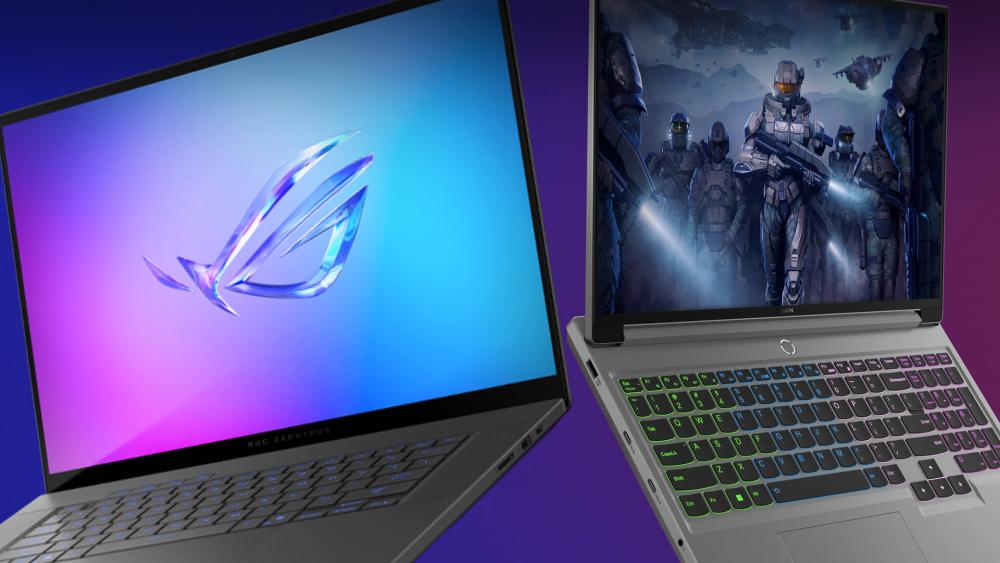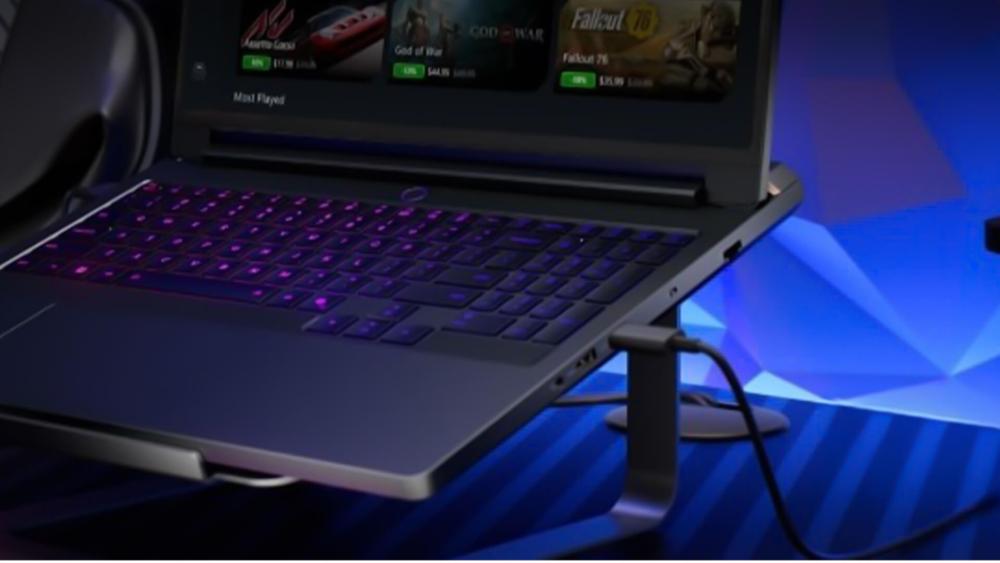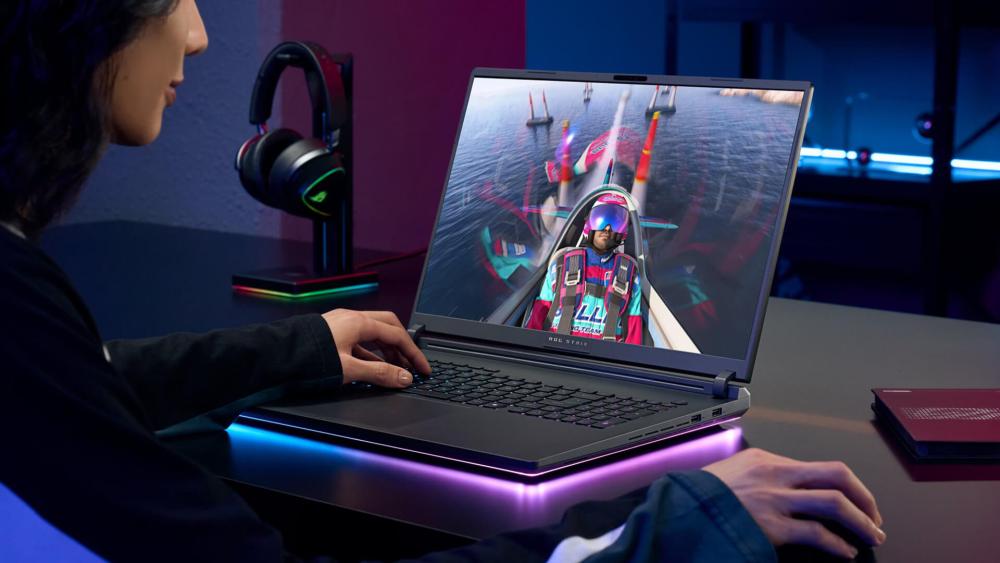POSTED: 17 October, 2025
Zephyrus vs Legion: Which Gaming Laptop Is Right for You?
Gaming laptops have evolved far beyond their original purpose. Once reserved for competitive gamers and hardcore enthusiasts, today’s premium devices are designed for everyone from students and streamers to content creators and hybrid professionals.
In 2025, owning a high-performance laptop isn’t just about gaming; it’s about power, portability, and personality.
Two names dominate this modern gaming notebook showdown: ASUS Zephyrus and Lenovo Legion. Both brands have redefined what users can expect from a gaming laptop comparison offering incredible displays, advanced cooling systems, and configurations that rival desktop PCs.
If you’ve found yourself asking, “Is Zephyrus better than Legion?”, you’re not alone.
In this guide, we’ll break down everything from gaming benchmarks to battery life, from cooling systems to cost-performance ratio to help you decide which gaming laptop is right for you.
Comparing two Brands: Zephyrus vs Legion

Before diving into performance numbers, it’s important to understand what makes each brand tick. Both ASUS and Lenovo have carved unique identities in the world of premium gaming machines, appealing to slightly different types of users.
ASUS Zephyrus: Style Meets Substance
The ASUS Zephyrus series represents the future of portable gaming laptops; sleek, lightweight, and built with both gamers and creators in mind. It delivers desktop-grade gaming experience in a lean chassis just 16.9~17.9mm thick.
With an emphasis on aesthetics and engineering, Zephyrus models feature magnesium-alloy bodies, slim bezels, and intelligent thermal layouts that maintain performance without adding bulk. The tough exterior surrounds contrasting finishes with diamond-cut edges that accentuate the design.
Zephyrus is perfect for those who want a gaming laptop that doesn’t look like one. Whether you’re editing 4K footage in a café or hopping into a few rounds of Apex Legends between meetings, it’s designed for a life on the move.
Explore ASUS ROG Zephyrus Laptops and experience the blend of art and engineering.
Lenovo Legion: Power Without Compromise
The Lenovo Legion line, on the other hand, takes a performance-first approach. These devices are slightly bulkier but deliver exceptional thermal control and often better price-to-performance than rivals. Legion laptops are known for their reliability and raw muscle; the type that can push max settings without breaking a sweat.
Lenovo’s design language leans toward the classic gamer aesthetic: sturdy builds, bold logos, and excellent durability. If you care less about portability and more about FPS performance comparison, Legion may already be winning your heart.
Discover Lenovo Legion Laptops built for serious gamers who value raw power.
Performance Comparison: Gaming, CPU & GPU
When it comes to performance, both Zephyrus and Legion pack some of the best silicon available. In 2025, gaming laptop hardware has reached astonishing levels of efficiency and these two line-ups showcase it beautifully.
CPU: Ryzen vs Intel Laptops
The Zephyrus range offers configurations with AMD Ryzen 9 and Intel Core i9 processors, making it a great option for multi-core CPU gaming and creative workloads alike. ASUS’s engineering ensures consistent turbo boost speeds without dramatic thermal throttling.
Lenovo Legion, meanwhile, remains a favourite for gamers who love overclocking support and sustained performance. Many Legion variants use Intel’s latest i9 HX chips, optimised for extreme gaming performance.
GPU: RTX 4060 to RTX 4090 Range
Both lineups come with NVIDIA RTX laptops ranging from the RTX 4060 up to the flagship RTX 4090, complete with real-time ray tracing and DLSS 3.5 support. In benchmark tests such as 3DMark and Time Spy, Zephyrus laptops like the M16 tend to score slightly higher due to optimised power delivery. Legion laptops, however, maintain superior sustained frame rates under heavy loads, thanks to larger chassis and cooling zones.
CPU & GPU Power
| Factor | ASUS ROG Zephyrus | Lenovo Legion |
| Overall Overall performance | Good to very good, balanced for portability. | Excellent, maximising raw power for gaming and workloads. |
| Gaming | Capable for gaming, but lower GPU TGP results in lower frame rates than a comparable Legion. | Excellent for gaming, delivering higher frame rates due to higher wattage. |
| Content creation | Fast enough for most creative tasks, especially with stunning OLED screens, but can be outperformed by Legion in multi-core and GPU-heavy renders. | Superior for demanding creative workflows like video editing and rendering, thanks to higher CPU and GPU power. |
While Zephyrus performs admirably for creative workloads and light gaming, Legion excels in high-load scenarios; think long raids in Cyberpunk 2077 or maxed-out Battlefield sessions.
Legion’s enhanced TGP allows it to maintain higher frame rates and better thermal headroom, while Zephyrus focuses on efficiency and quiet operation.
For instance:
- Zephyrus G16 (RTX 5070 Ti) → ~110W TGP, cooler, quieter, ~125 FPS average in QHD
- Legion Pro 7i (RTX 5080) → ~175W TGP, sustained boost, ~145 FPS average in QHD
Thermal Throttling and Cooling Systems
Thermal management is where Legion truly shines. Its advanced laptop cooling system and dual-fan architecture maintain peak GPU performance longer, with less noise under load. Zephyrus models use liquid metal cooling and vapour chambers, offering silent operation but smaller exhaust areas due to slimmer builds.
In short:
- Zephyrus: cooler to the touch, whisper quiet, but limited sustained boost
- Legion: slightly louder, higher sustained FPS, minimal throttling
Storage and RAM Expandability
Both allow for dual SSD slots and up to 64GB DDR5 RAM, though Legion often provides easier upgrade access. For creators and power users, that expandability can be a decisive advantage.
Zephyrus is refined and efficient; Legion is powerful and relentless.
Display and Design

When comparing gaming laptop displays, these two brands take distinct routes.
Display Options
- ASUS Zephyrus: Offers 14”, 15.6”, 16”, and 17” variants. Many models use QHD gaming laptop displays with 165Hz or 240Hz refresh rates. Premium models include IPS vs OLED gaming laptop options with stunning colour accuracy; ideal for content creators.
- Lenovo Legion: Sticks to 16” and 17” formats, with 144Hz vs 240Hz display options. Its Mini-LED screens excel in brightness and HDR support, offering immersive visuals for extended sessions.
Design Language
- Zephyrus: Aluminium chassis, minimalist aesthetic, RGB subtly integrated. Portable yet premium.
- Legion: Bold, angular edges, extensive laptop RGB lighting, and a solid, gamer-focused design.
Both feature superb keyboards with responsive switches, large precision touchpads, and excellent key travel though Legion’s keyboard offers deeper actuation, making it the better choice for competitive players.
If you’re a creator, you’ll adore Zephyrus’s colour-accurate screens. For gamers chasing every frame, Legion’s larger display options deliver superior immersion.
Battery Life & Portability

Battery performance is where Zephyrus often shines.
- Zephyrus: Equipped with large 90Wh batteries, some models deliver up to 10 hours of productivity and 5–6 hours of light gaming impressive for such powerful machines. They also support USB-C charging, making them truly travel-friendly laptops.
- Legion: Larger batteries (99Wh) but shorter life due to higher TGP GPUs. Expect around 6–7 hours for general use, and roughly 3 hours for gaming.
| Feature | ASUS ROG Zephyrus | Lenovo Legion |
| Battery Capacity | 90Wh (up to 10 hours productivity / 5–6 hours gaming) | 99Wh (6–7 hours productivity / 3 hours gaming) |
| Charging | USB-C fast charging supported. Includes a smaller, lighter charging brick, which adds to its overall portability. | Proprietary charging; larger power brick |
| Weight | The Zephyrus is known for being ultra-portable. A 14-inch model like the ROG Zephyrus G14 (2025) weighs approximately 3.3 lbs (1.5 kg). A larger 16-inch model, the Zephyrus G16 (2025), is still relatively light at 4.2 lbs (1.91 kg). | Standard Legion laptops, like the Legion 5i (2025), weigh around 4.3 lbs (1.95 kg), while higher-performance models such as the 18-inch Legion 9i can weigh over 8 lbs (3.74 kg). |
| Travel Friendliness | Excellent; compact, portable, perfect for students & commuters | Moderate; powerful but less mobile |
| Thermal Behaviour Under Load | Runs warmer under extended gaming sessions | Better sustained cooling over time |
If you value battery life under load, portability, and travel-friendly design, Zephyrus wins comfortably. The Legion, however, remains the king of stationary, high-performance gaming.
Browse more Gaming Laptops at Box.co.uk to compare travel-ready vs desktop-class models.
Software & User Experience
In the software and user experience domain, Lenovo's Legion line is generally considered more reliable and straightforward compared to the more feature-rich but historically buggy and resource-intensive software used in the Asus Zephyrus series.
This difference reflects the priorities of each brand; Lenovo emphasises a clean, consistent user experience, while Asus pushes more features, sometimes with performance trade-offs.
| Feature | ASUS ROG Zephyrus | Lenovo Legion |
| Utility Software | Armoury Crate unified control for performance, thermals, lighting | Lenovo Vantage performance profiles, BIOS updates, system tuning |
| Ease of Use | Polished, overly complex interface with real-time graphs | Stable, feature-rich but less modern interface |
| Profiles | Silent, Performance, Turbo modes for flexible control | Balanced, Performance, and Custom profiles |
| Performance | Minimal; clean out-of-box experience. It is infamous for multiple background services running and interfering with system performance. | Minimal; focused on core gaming utilities. The software runs efficiently in the background, allowing the system's full power to be dedicated to gaming or demanding applications. |
| Audio | Premium Dolby Atmos speakers. Often praised for having some of the best speakers on a Windows laptop, producing a rich and full sound profile. | Average speakers, serviceable but not standout |
| Touchpad/Keyboard Experience | Generally, it offers premium typing and tracking experience. Key travel is comfortable, and the touchpad is often larger and quieter than the Legion's. | Responsive keys; larger deck, includes numpad |
In terms of user experience, Zephyrus wins on visual polish, while Legion wins on stability. Both have minimal bloatware and easy driver updates.
Pricing and Value for Money
Let’s talk about cost-performance ratio where the decision gets tricky.
Price Overview (Approximate, 2025 UK Market)
| Factor | Asus ROG Zephyrus | Lenovo Legion |
| Typical pricing | The Zephyrus line is generally more expensive than a comparably equipped Legion laptop due to its focus on premium materials, a thinner chassis, and other high-end features. | The Legion line offers more aggressive pricing and focuses on maximising gaming performance. |
| Pricing tiers | Entry-level Zephyrus: Can sometimes overlap with higher-end Legion models in price, but you'll get lower performance from the Zephyrus. High-end Zephyrus: Costs significantly more than a comparable high-end Legion due to premium displays, materials, and portability. |
Entry-level Legion (e.g., LOQ, Legion 5): Provides excellent entry-level gaming power at a much lower price than a Zephyrus. High-end Legion (e.g., Legion Pro 7i, Legion 9i): Offers top-tier gaming performance that might approach or even exceed the price of premium Zephyrus models, but still with a focus on raw power over premium features. |
| Model | Entry (£) | Mid (£) | High-End (£) |
| ASUS Zephyrus | Approx. 1,299 | Approx. 1,799 | Approx. 2,699+ |
| Lenovo Legion | Approx. 1,099 | Approx. 1,499 | Approx. 2,199 |
If you’ve been wondering, “Is Legion cheaper than Zephyrus?”, the answer is yes, it’s true. The Legion line generally costs less for similar specs because Lenovo prioritises performance efficiency over ultra-slim engineering.
At around £1,500, the best Legion laptop under £1500 offers an RTX 4070 and Intel i9 CPU an incredible deal for gamers. Zephyrus, meanwhile, leans into the premium vs budget gaming laptops debate by focusing on refinement, not just specs.
So, Zephyrus is worth the price, if you value design, portability, and quiet performance. Otherwise, Legion offers unbeatable gaming laptop deals 2025 for those chasing pure power per pound.
Browse Gaming Laptops to compare configurations and prices side by side. For creators and professionals, check out ASUS Laptops.
User Personas: Who Should Buy Which?

Understanding who each machine serves best can make your decision easier.
Zephyrus Ideal For:
- Content creators who need colour-accurate screens and lightweight gaming laptops
- Professionals who want performance and portability
- Streamers and gamers needing a best laptop for streamers powerful yet quiet
Recommended Model:
ASUS ROG Zephyrus G14 (2025) GA403 GA403UM-QS006W – AMD Ryzen 9 270, 16GB RAM, 1TB SSD, RTX 5060, 14” QHD+ Display, Windows 11 Home (£1,699.99).
- Why it fits: A thin-and-light 14” powerhouse, ideal for editing on the go and producing content anywhere.
ASUS ROG Zephyrus G16 GU605CP-QR007W – Intel Core Ultra 9 285H, 32GB RAM, 1TB SSD, RTX 5070, 16” OLED Display, Windows 11 Home (£2,399.95).
Why it fits: Combines elegant design with serious GPU power for a balanced, future-proof student laptop.
Legion Ideal For:
- Hardcore gamers seeking high frame rates and FPS performance comparison wins
- Budget-conscious users who prioritise hardware value
- Long-term gamers who appreciate robust cooling and reliable high-performance laptops
Recommended Model:
Lenovo Legion 5 15IRX10 – Intel Core i7-13650HX, 32GB RAM, 1TB SSD, RTX 5060, 15.1” Display, Windows 11 Home (£1,349.99).
- Why it fits: Offers top-tier CPU and GPU performance in a more affordable package, perfect for dedicated gamers.
Lenovo Legion Pro 5 16AFR10 – AMD Ryzen 9 9955HX, 32GB RAM, 2TB SSD, RTX 5060, 16” Display, Windows 11 Home (£1,999.99).
- Why it fits: A high-performance workstation with incredible thermal management, built to stay cool and powerful through extended gaming sessions.
Find Your Perfect Gaming Laptop at Box.co.uk
When comparing Zephyrus vs Legion, both series easily rank among the best gaming laptops of 2025. They represent two distinct philosophies in premium gaming; Zephyrus focuses on elegant design and portability, while Legion is all about endurance, power, and cooling.
For those still asking themselves, Should I buy a Zephyrus or Legion laptop? The answer would be that both brands embody innovation, adaptability, and reliability; the hallmarks of a truly premium gaming machine.
Ready to find your perfect match? Explore the full range of Gaming Laptops at Box.co.uk; the UK’s trusted destination for the latest ASUS, Lenovo, and other leading gaming laptops. Whether you’re after portability, power, or the ultimate all-rounder, Box makes it easy to compare, choose, and elevate your gaming experience.
FAQs
Is Zephyrus better than Legion?
It depends on your needs. Zephyrus excels in portability and design, while Legion dominates raw gaming performance and value.
What’s the best Legion laptop in 2025?
The Legion 7i Pro (RTX 4080) stands out for its incredible performance, cooling, and price balance.
How’s Zephyrus battery life for travel?
Zephyrus models like the G14 and G16 last up to 10 hours for productivity, making them ideal travel-friendly laptops.
Which has better cooling – Zephyrus or Legion?
Legion systems feature larger laptop cooling systems, sustaining higher FPS under long gaming sessions.
Is Legion cheaper than Zephyrus?
Generally yes. Legion offers a stronger cost-performance ratio, making it better for budget-conscious gamers.